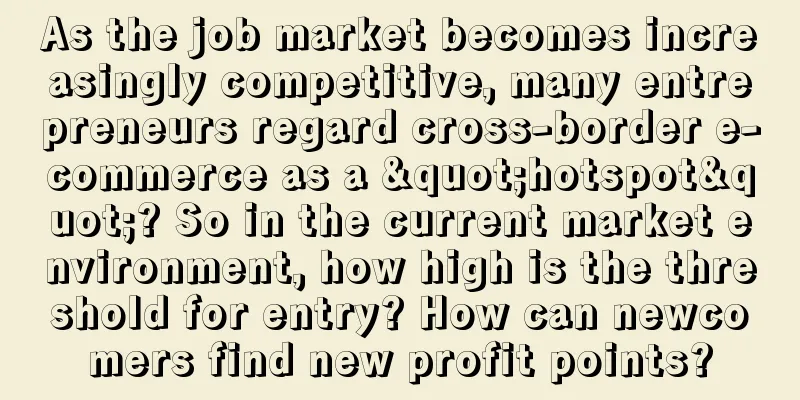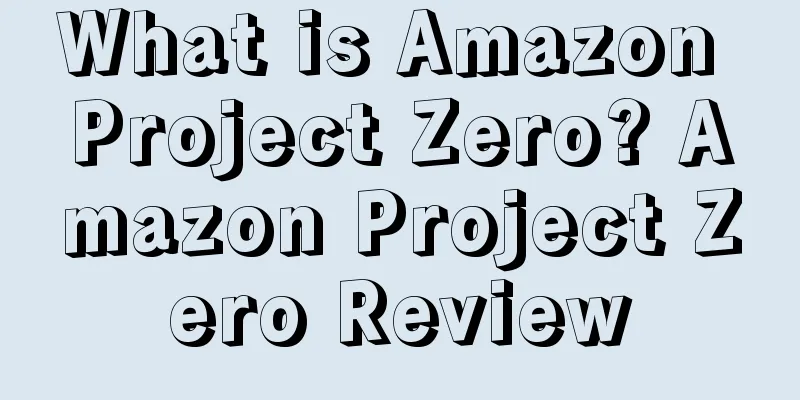|
The job market is getting harder and harder now, with all kinds of layoffs. I don’t want to worry about not being able to find a suitable job in the future, so I want to take action now while I have saved some money.
Many entrepreneurs regard cross-border e-commerce as a "hot spot" for entrepreneurs, but to be honest, I know nothing about this industry. I want to know now, in 2024, is Amazon's cross-border e-commerce business still worth doing?
- Industry status: As a complete layman, I want to know what the current status of Amazon's cross-border e-commerce will be in 2024? Is the market saturated?
- Barrier to entry: I have no experience in e-commerce. I wonder how high the barrier to entry is? What do I need to prepare? What do I need to learn?
- Policy changes: Amazon’s policies are constantly updated. Are these changes friendly to newbies?
- Profit margin: In the current market environment, is there still a lot of profit margin for novices? How to find new profit points?
- Honestly: If you have the opportunity to start over, would you still choose Amazon cross-border e-commerce? What lessons do you want to tell newcomers?
"Wonderful Reply"
A fairy tale or a joke? - Amazon Little Player Agree from: 123chenshao, Radish King, Celin, Zppppp, a88255535 more » 1. Industry status: The market is not saturated. No one dares to say that he has conquered a certain category. However, there are certain categories where new sellers will suffer losses.
2. Entry threshold: The entry threshold is not high if you can study with peace of mind. It is recommended to go to the official public account (Amazon Global Selling and Amazon Advertising) to watch free courses, which is much better than the courses outside that charge you thousands or tens of thousands of dollars.
3. Policy changes: The review process for registering a store this year is very simple. After registration, you will receive an email from a special account manager with the manager’s WeChat QR code (I have registered in 21 years and have never seen any account manager). Many account managers can still seriously answer questions that you don’t understand, but there are also some who will ignore you.
4. Profit margin: Amazon’s profits should be among the best of all cross-border platforms, but for novices, don’t expect to succeed and make money right from the start (of course there are such chosen ones). Different products will have many pitfalls, and novices may more or less step on them after selecting a product.
5. To be honest: If I had the chance to start over, I would definitely join Amazon in 2020 instead of working for JD.com and then switching to Amazon in 2021. Lessons learned: don’t run ads without reviews; look at competitors or excellent links to improve your aesthetic level; there are many teachers who teach advertising online, with various schools of thought, you have to carefully distinguish them... Quantum Society • Shenzhen • 2024-07-26 15:45 All of them are very good, but there is one point: if there are no comments and no advertising, how can we open orders? Off-site? Or natural traffic?
Fairy tale of the years or a joke • Shenzhen • 2024-07-26 16:45 @Quantum Society: VINE will be given away when the product is sold, and direct reviews will be posted at the same time. Then, when the direct reviews are displayed, ads will be posted. After the direct reviews are removed, VINE will reply soon.
Anonymous user Agree with: I'm really sorry, never4too, I love autumn the most among spring, summer, autumn and winter, Cindy4bestseller, Another autumn has passed more » 1. Industry status: In 2024, it is indeed becoming more and more difficult to do business in Amazon, and all kinds of messy expenses are increasing. However, it depends on yourself. There are many people around me who make a good income from a single order, and there are also many who lose money.
2. Entry threshold: If you have no experience, no resources, no funds, and don’t like to learn, it is recommended not to do it, otherwise you will lose money. Even if you are the top seller of many companies and have sufficient experience, it is easy to lose money if you work alone on Amazon, not to mention a newbie.
3. Policy changes: This is difficult to answer. For example, the registration process is indeed better, but the various miscellaneous fees are getting higher and higher.
4. Profit margin: If you are looking for a common product to put on the shelves of 1688, or a product with a relatively low threshold, the profit will basically not be high. If you want high profits, you have to make products with a high threshold.
5. Honestly: If I were to start over, I would definitely choose Amazon again, because Amazon is a new industry. First, the education requirements are not high. Second, it is suitable for grassroots entrepreneurship and for ordinary people. There are relatively many opportunities in this industry.
Secondly, I want to say to the newbies: If you want to work alone on Amazon, you have to calm down and learn, go to Amazon's official website to watch various advertising courses. You also need to read various books to increase your cognition and learning ability, because Amazon often encounters some messy things, and you can't stand it without a strong enough mentality.
Finally, if you have nothing, no money, no experience, no resources, and are too lazy to learn anything, but still want to work for Amazon, you might as well give me the money, and I will at least say thank you. Quantum Society • Shenzhen • 2024-07-26 15:58 First, the educational requirements are not high. Second, it is suitable for grassroots entrepreneurship and for ordinary people to start a business. There are relatively many opportunities in this industry. I agree with this point. Especially in Guangdong, it is so convenient to find a job. There are also many opportunities to achieve high income. But if you work alone, you need to be able to endure loneliness. You may spend most of your time at home dealing with account issues, researching advertising strategies, and analyzing data.
goglen • Fujian • 2024-07-28 12:44 First, the educational requirement is not high, and second, it is suitable for grassroots entrepreneurship. These two points are destined to have no threshold, but the price must be raised, which is not a good thing.
poom1128 Support from: Rocky Tuodatong, Coffee House in the Deep Forest I can't answer as an old hand, I can only answer as a new rookie. Three years ago, a friend introduced me to the industry, but due to financial reasons, I let my family members join first. This year, I finally resigned and opened my own new shop. Now the first batch of goods is ready to arrive at Hong Kong. I finally got the opportunity I got a few years ago.
1. Industry status: As a complete layman, I want to know what the status of Amazon's cross-border e-commerce will be in 2024? Is the market saturated?
No industry will be saturated. Even the worst industry will have people coming in and out.
2. Entry barriers: I have no experience in e-commerce and I don’t know how high the entry barriers are now. What do I need to prepare? What do I need to learn?
There is no way to answer this question. It depends on one's learning ability and investment mentality. If one has a sufficient supply chain, the entry threshold will certainly be better than others who do not have resources in this industry, but there is no absolute answer.
3. Policy changes: Amazon’s policies are constantly updated. Are these changes friendly to newbies?
At present, I personally feel that the platform lowers the threshold and provides more opportunities, such as new backend functions, shipping rules, etc.
4. Profit margin: In the current market environment, is there still a large profit margin for novices? How to find new profit points?
You need to find the market yourself. Different supply chains will result in different profits, which is also related to the capital invested.
5. Honestly: If you have the opportunity to start over, would you still choose Amazon cross-border e-commerce? What lessons would you like to tell newbies? I would definitely choose this. I used to work in raw material sales and I feel there are many opportunities in this industry. I have no experience or lessons to share.
Hongxing Cross-border - hxmjx1 1 Industry status: Amazon has many sellers joining every year. There is no such thing as market saturation. There are opportunities on any platform. Amazon has quite a few sellers joining every year. There is a rough ratio that about 20 out of 100 novice sellers can survive. 10 are not much different from working part-time, but have relatively free time. 5 people earn more and 5 people make a lot of money. This is a rough ratio.
2 Entry threshold: Amazon is the platform with the most and most complete rules. The advantage is that it will not be squeezed out by big sellers, and there are ways for small sellers to survive. The disadvantage is that there are too many rules, which is not very friendly to novices. It is not recommended for those without any experience, and it is not recommended to take classes to learn. There are too many leeks. There are two methods. 1. Go undercover and find a cross-border company to take a class in the first half of the year to learn about product selection, advertising, how to build listings, etc., so that you can learn more about this industry and open your own store. 2. Learn while opening a store. When you encounter problems, just use Douyin to answer them. Baidu can solve 80% of your problems. For the remaining 20%, you can spend money to find someone to solve it. It can be regarded as tuition fee, which is more suitable than taking any class.
3 Policy changes: It’s hard to say, but it’s indeed a little harder to open a store this year, but I don’t think this has any impact
4. Profit margin: Amazon's profit is pretty good on the platform. It is impossible to calculate the profit of each category or each product, but if you distribute the goods, the net profit is about 10-30%. The profit is high for those with a threshold, but the difficulty is how to get in (medical equipment, health care products, etc.)
5 To be honest: This is not an easy industry. I don’t just put the product up for sale and wait for orders to make money. There are a lot of things to learn, and it is much more tiring than working part-time.
Mike talks about cross-border business - IT guy born after 1995 Agree with: Sharly , ZWBYLMJ , naijgnef 1. Industry status: Amazon has also entered the low-price market, which may be a wave of opportunities. However, compared with the previous years when people could make money as soon as they entered the market, it is definitely getting harder and harder to do business now. However, no matter how difficult it is, there will always be winners.
2. Entry threshold: It is not recommended to have no foundation. You can start with relevant experience. At least you should have some knowledge and know what the various chains and links in this industry are doing. But remember not to be ripped off by some of the operating agents on the market.
3. Policy changes: The overall entry threshold has become lower, but various policies are becoming more and more stringent, and the platform still focuses on protecting its own ecosystem.
4. Profit margin: It depends on what kind of products you make. You should look more carefully at the early stage of product selection, and then choose the right supply chain.
5. To be honest: Yes, there is nothing you can do if you are not chosen by God to be a worker. It is a job that suits you.
What I want to say to novices is to endure more hardships, step on more landmines, and explore more on your own. Many good tools and good teaching on the Internet are free, and cross-border people still love to share. However, there are good and bad ones, and we must learn to extract the essence, especially be wary of some so-called knowledge payment, there are too many routines, my evaluation is exaggerated
Old cow gets beaten - 90s generation who make a living~ 1. Industry status: As a complete layman, I want to know what the status of Amazon's cross-border e-commerce will be in 2024? Is the market saturated?
——No matter how saturated it is, it will still be the least saturated year in the next few years. But compared with the era of making money by selling out as soon as it was put on the shelves in 2021, those who have experienced it will find it increasingly difficult to do business. In addition, the four poisonous insects in China are determined to get low prices, and Amazon wheat will only become more and more difficult in the future.
2. Entry barriers: I have no experience in e-commerce and I don’t know how high the entry barriers are now. What do I need to prepare? What do I need to learn?
——If you have the conditions, it is best to find a related job to practice for half a year. Even if you start from a packer and shipper, you will suffer. If you are anxious, you will suffer. If you are optimistic, you will fall. You can refer to the official tutorial materials for the materials you need to prepare. They are free. Only what you figure out by yourself is the real knowledge.
3. Policy changes: Amazon’s policies are constantly updated. Are these changes friendly to newbies?
——Very unfriendly. Getting more and more harsh.
4. Profit margin: In the current market environment, is there still a large profit margin for novices? How to find new profit points?
——Newbies should not think about profit margins. If you don’t lose all your budget within half a year, you are already considered to have some ability and luck.
5. Honestly: If you have the opportunity to start over, would you still choose Amazon cross-border e-commerce? What lessons would you like to tell newbies?
——The truth is: I started preparing for the civil service exam since my freshman year.
Anonymous user
Agree with: Bai Yueguang SSS, Quantum Society Let me simplify it by saying: I don’t think it’s easy to succeed at Amazon now.
Operational ability: This is the most basic, but even if you have strong operational ability, it cannot guarantee that you will succeed. Many powerful operators find that they have no idea how to select products after going out to work on their own.
Product selection ability: This is a core skill. For a start-up company to continue to expand and develop, it is likely that the boss himself knows how to select products.
Exploring supply chain capabilities: This is a finishing touch. In the early stage of a new product, if the product is a few or ten yuan more expensive, it may not feel like a big profit. In the later stage, when the product volume increases and competition becomes fierce, the price is reduced. At this time, procurement costs play a key role. In addition to procurement costs, a good supply chain can also better cooperate with product upgrades.
Luck: I have to say that sometimes luck does play a part.
Self-improvement ability: E-commerce is not static. Constantly improving one's own operational and product selection capabilities and learning from past experiences are also very important abilities.
fineyishun Agree from: Mr. Robin 1. Industry status: The cross-border situation in 2024 will be no different from that in previous years, so it is hard to say. No one knows whether it is saturated.
2. Entry barriers: I have no experience in e-commerce and I don’t know how high the entry barriers are now. What do I need to prepare? What do I need to learn?
----The threshold is not high, just prepare money, learn basic English, and know a little bit
3. Policy changes: Amazon’s policies are constantly updated. Are these changes friendly to newbies?
--Policy changes, as long as they are not biased towards sellers, are not good
4. Profit margin: In the current market environment, is there still a large profit margin for novices? How to find new profit points?
----The profits are similar, except for those with high barriers to entry. The most important thing for a novice is to get into the industry. It is recommended to work for more than half a year to gain some understanding.
5. Honestly: If you have the opportunity to start over, would you still choose Amazon cross-border e-commerce? What lessons would you like to tell newbies?
----If I were a normal person, I would probably take the civil service exam, get married early, and do an Amazon side job in my spare time.
Lessons learned - after working for half a year, you will have the knowledge and basic operational skills, as well as the ability to avoid product failures. Don't just start right away. The slower you go, the faster you die.
YTR Sunny Day - A post-90s cross-border e-commerce worker Supported by: Quantum Society 1. Industry status: At present, as a cross-border e-commerce platform, Amazon's market capacity is still relatively large, but the competition in a considerable number of categories is too fierce and requires caution.
2. Entry threshold: The entry threshold is very low. Basically, a junior college degree or even a high school degree is enough to get started. But I don’t understand why many companies require a bachelor’s degree or above, which prevents many people from taking the path of Amazon.
3. Policy changes: Regarding policies, Amazon should be the platform with the most certifications, inspections, and reviews. Many account and product policies will require you to invest more money to find agencies and service providers to make reports, and your account may be suddenly cancelled at any time.
4. Profit margin: There is profit, otherwise there wouldn't be so many people rushing in. But because of these idiots rushing in, the price can't be lowered any further. The clothes that originally sold for 19.99, with a gross profit of 30%, these idiots directly come in and sell them for 9.99. I really don't know if these idiots are here to give away money.
5. To be honest: I would still choose Amazon. I am a science and engineering man majoring in communications engineering. I graduated by accident at the end of 2018 and came to Shenzhen. I didn’t know what to do, so I accidentally went to a distribution company called Shijia. Since then, I have been on the road of no return to Amazon. Although it is a bit hard, fortunately, the current salary is not bad, 1.5W in the off-season and 3W in the peak season.
254286638 1. Amazon is now a red ocean industry
2. The entry threshold is very low (but precisely because of the low threshold, there are many competitors and it is very competitive). Unless you are very interested in e-commerce, you'd better stay where you are and don't waste your time and money.
3. Policy changes in recent years have been mainly centered around “cutting leeks” and are not very friendly to newcomers (only for Amazon)
4. Profit margin. If you are making public mold products, there is basically no profit. If you have high-quality factory resources (but most people don’t have them), the profit can be very high.
5. If I could do it again, I could have worked in the industry for a few years 20 years ago and made a lot of money. But now? To put it bluntly: 1949 was like the Nationalist army! Why are there still so many people doing e-commerce now? Aren’t they all the people who have benefited from the profits and have strong skills who stick with it? Now, the boom of this industry has long passed.
Final advice: If you want to start your own business and have no experience, I won’t stop you from throwing money into the water. (Now, Amazon startups start with over a million dollars. If you start your own business and only make a few thousand dollars a month, that’s not good. You can earn more than that by moving bricks.)
Assuming I'm a good person - we all live in the gutter, some of us still look up at the stars Agree with: gambitious, Shenzhen specialty dangdangdang 1. Industry status: There is no need to worry about saturation in the short term, but competition will not decrease, including among major platforms.
2. Entry threshold: The threshold is relatively low. Generally, companies only require a college degree or above at level 4, but there is less demand for new recruits.
3. Policy changes: Regarding policies, Amazon has relatively strict requirements based on different categories, various certifications and local country policies, and Amazon policies are updated frequently.
4. Profit margin: The profit depends on different categories. For example, the profit margin of the US war and the bloody sea is definitely not high. The key is that it is difficult to find the blue ocean.
5. To be honest: you must prepare an electric car. As a worker, this is not a long-lasting industry. Many people will eventually go out on their own. Of course, if you fail, you still have the possibility of being promoted.
The Wind's Breathless Slash - Post-00s The big guys are answering the questions above, let me give you a few words
I came to Shenzhen in June this year to look for a job at Amazon (of course it was because I failed the civil service exam). There are indeed many companies (some companies are recruiting 365 days a year, don't go there), but there are very few good companies where you can learn something. And I don't know if it's graduation season or something, how can there be 985/211 students competing with me in wc, I just passed the level 4 exam of an ordinary second-tier university~
Fortunately, after crazy interviews, constant summarization and making up my resume, I finally found the job.
No matter what the future holds in the industry, you should study hard now that you have entered it.
JJPhilip - JJPhilip Agree with: Flowing If you are a layman, you need to prepare a minimum of 500,000 or 1 million yuan. And you need to calculate the expected profit points. It is possible that you are well-connected enough to enter a certain industry/sub-category through social connections, and others are willing to take you with you. You can use your funds to exchange for some shares/equity, so it is possible that the net profit/net return you will eventually get is 4 to 8 points, which is only slightly better than the annual income of the bank. If others have been working in Amazon for many years and want to trick you into joining, it is possible that you will lose everything in a minute.
Anonymous user It's 2024 now, and the threshold for cross-border business is getting lower and lower. Anyone with some basic knowledge of e-commerce can basically enter. Currently, mainstream cross-border platforms such as Amazon, eBay, Walmart, AliExpress, TEMU, SHEIN, etc. all need a large number of Chinese sellers to enter. It is conceivable that the competition is fierce. At present, domestic e-commerce is already very competitive, and refunds and various complaints are prevalent. Many merchants have turned to the cross-border direction. To enter the cross-border e-commerce industry, you must be mentally prepared and have a solid family background.
Anonymous user Agree with: Tutu loves to eat rabbits, Mr. Robin Everyone is making it too simple. Don't you know that new and old accounts are often blocked? The risk of violation is ironically high? The capital startup threshold is not a threshold? Strategic loss is not a threshold? Supply chain is not a threshold? Operation strategy experience is not a threshold? Product selection ability is not a threshold? Advertising promotion ability is not a threshold? R&D ability is not a threshold? All these require money and talent! And all kinds of risk control experience? And so on.
| 









